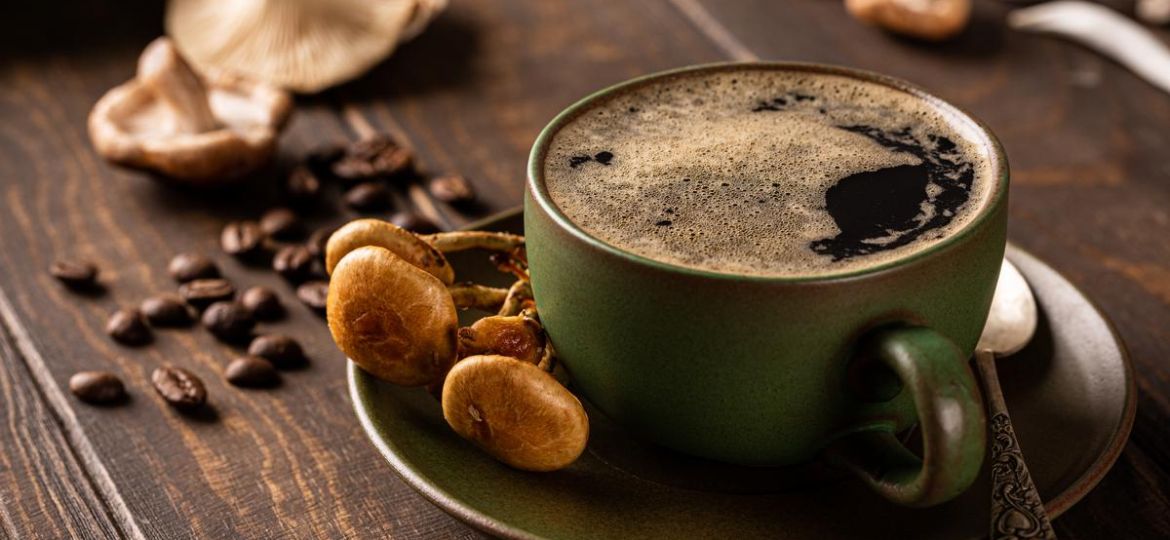
Mushroom coffee – sounds intriguing, right? Well, it’s not your usual cup of joe. This unique blend combines traditional coffee with the goodness of medicinal mushrooms. But don’t worry, it’s not about floating mushrooms in your coffee!
- History: The idea isn’t new. During World War II, Finns used mushrooms as a coffee substitute. Plus, in Asian cultures, especially in Chinese medicine, mushrooms have been a health staple for ages.
- Current Trends: Today, mushroom coffee is catching on in the wellness world. It’s seen as a healthier alternative to regular coffee, blending the benefits of coffee and medicinal mushrooms.
What Makes Mushroom Coffee Unique
What sets mushroom coffee apart? It’s all in the ingredients and how they play together.
- Ingredients:
- Mushrooms Used: We’re talking about medicinal mushrooms like Chaga, Lion’s mane, Reishi, and others. These aren’t your typical kitchen mushrooms but are known for their health benefits.
- Coffee: The base is still good old coffee beans. So, you get that familiar coffee taste with an extra health kick.
- Comparison with Regular Coffee:
- Flavor: Many say mushroom coffee tastes similar to regular coffee – just a bit nuttier and earthier.
- Health Benefits: This is where mushroom coffee really shines. It’s touted for benefits like reduced anxiety and better immunity.
Preparation and Varieties
Making mushroom coffee is an art in itself. And you’ve got options on how to enjoy it.
- Preparation:
- Process: Medicinal mushrooms are dried, ground into a fine powder, and then mixed with ground coffee beans. This blend is what gives mushroom coffee its unique properties.
- Varieties:
- Instant Coffee Packets: For those on the go.
- Ground Coffee Blends: For the traditional coffee brewing experience.
- Coffee Pods: Convenient and quick for pod coffee makers.
Mushroom coffee offers a twist on your regular coffee routine, blending tradition with modern wellness trends.
Overview of Medicinal Mushrooms in Traditional Medicine
Medicinal mushrooms have been the superstars of traditional medicine, especially in Asian cultures. They’re not just for adding flavor to your soup; they’ve been used for centuries for their health-boosting properties.
- Traditional Use: In Chinese medicine, mushrooms like Reishi, Chaga, and Lion’s mane have been used for promoting longevity and overall health.
- Modern Interest: Nowadays, these ancient practices are catching the eye of modern science. Researchers are diving deep into the potential health benefits these fungi offer.
Potential Health Benefits
Mushroom coffee brings more to the table than just a caffeine kick. Let’s break down some of the key health benefits:
- Immunity Boosting: Mushrooms are known for their immune-enhancing properties. They’re packed with antioxidants and beta-glucans, which help in strengthening your immune system.
- Cancer Prevention: Some studies suggest that certain mushrooms may have cancer-fighting properties. For instance, Turkey’s tail mushroom has been studied for its potential in supporting cancer treatments.
- Heart Health: Mushrooms like Reishi can play a role in heart health by helping to lower blood cholesterol levels.
- Brain Health: Lion’s mane mushroom, in particular, is famed for its potential to support brain health, including enhancing memory and concentration.
Scientific Evidence and Studies
While the health claims are impressive, what does science say? There’s a growing body of research, but it’s still in the early stages.
- Studies: Most studies are pre-clinical, meaning they’re done in labs or with animals. Human studies are fewer but growing in number.
- Results: The results are promising but not conclusive. For instance, some studies show mushrooms can boost immunity, but more research is needed to fully understand their impact on human health.
Comparison with Regular and Decaffeinated Coffee
Mushroom coffee is a game-changer for caffeine-sensitive folks. It’s a middle ground between the high caffeine content of regular coffee and the minimal caffeine in decaf.
- Regular Coffee: A standard cup can pack about 95 mg of caffeine.
- Mushroom Coffee: It typically has about half the caffeine of regular coffee. This is because the mushroom powder dilutes the caffeine concentration.
- Decaf Coffee: Almost caffeine-free, but some people miss the ‘kick’ that caffeine provides.
Impact on Health
The reduced caffeine in mushroom coffee can be a big plus for your health, especially if you’re sensitive to caffeine.
- Reduced Anxiety and Jitters: Less caffeine means less chance of feeling anxious or jittery, a common side effect of regular coffee.
- Better Sleep: With lower caffeine levels, mushroom coffee might be less likely to disrupt your sleep patterns.
- Heart Health: For those with certain heart conditions, reducing caffeine intake is often recommended. Mushroom coffee can be a good alternative in this case.
Mushroom coffee offers a unique blend of traditional health benefits with a modern twist. It’s a great option for those looking to reduce their caffeine intake while still enjoying a flavorful cup of coffee. Remember, though, while the health benefits are promising, more research is needed to fully understand and validate these claims.
Downsides and Considerations
While mushroom coffee is all the rage in wellness circles, it’s not without its caveats. Let’s sift through some of the potential downsides and considerations:
- Lack of Human Studies: Most of the research on medicinal mushrooms has been on animals or in test tubes. Human studies are still sparse, so it’s hard to say for sure how effective these mushrooms are for us.
- Safety and Dosage Concerns: Without solid research, it’s tricky to nail down the right dosage and fully understand the safety profile of mushroom coffee. This is especially important for people with health conditions or those taking medications.
- Cost Comparison: Mushroom coffee often comes with a heftier price tag compared to regular coffee. This is partly due to the cost of sourcing medicinal mushrooms, which are not as widely cultivated as coffee beans.
FAQs
Time to tackle some of the most common questions people have about mushroom coffee:
- Does mushroom coffee taste like mushrooms? Not really. It has a more earthy taste than regular coffee, but it’s not like sipping on a mushroom soup.
- Can mushroom coffee replace my regular coffee? Absolutely! If you’re looking for a lower-caffeine alternative with potential health benefits, give it a shot.
- Is mushroom coffee safe for everyone? Generally, yes. But if you have allergies, specific health conditions, or are pregnant, it’s best to consult with a healthcare provider first.
Read more about Product Review: Famiworths Upgraded Coffee Maker.
Conclusion
So, what’s the final scoop on mushroom coffee? It’s a fascinating blend of traditional medicine and modern wellness trends, offering a unique twist on your regular coffee ritual.
- Key Points:
- Health Benefits: Mushroom coffee is celebrated for its potential health benefits, like boosting immunity and supporting heart health.
- Caffeine Content: It’s a great middle-ground option for those who want to cut down on caffeine without going full decaf.
- Cost and Research: It’s pricier than regular coffee, and more human-based research is needed to back up all its health claims.
Final Thoughts: If you’re curious about mushroom coffee, it’s definitely worth a try. It’s a healthy, trendy alternative to traditional coffee, with the added bonus of medicinal mushroom benefits. Just keep in mind the cost and the current limitations in research. As always, listen to your body and consult with healthcare professionals if you have any concerns.
Read more about Product Review: Ninja 12-Cup Programmable Coffee Brewer.









